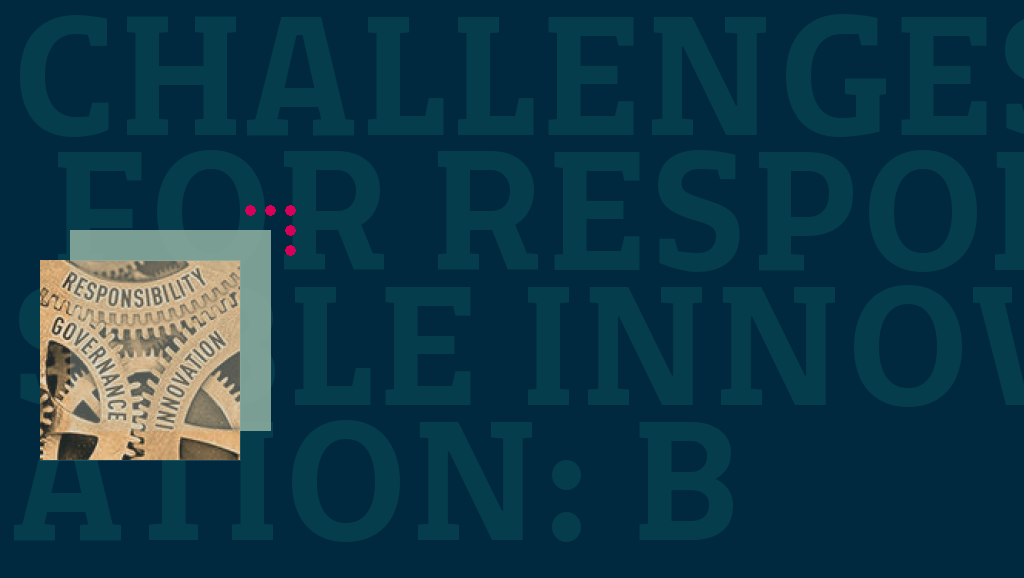The third Challenges for Responsible Innovation event was held in Brussels on 3 October in the DG Research and Innovation RTD library.
The event opened with an introduction from Rene von Schomberg in which he outlined the six deficits of Responsible Innovation described in his opening chapter of the International Handbook on Responsible Innovation, describing responsible innovation as a new paradigm enabled through institutional change.
A series of specific developments were noted as necessary, from a change in incentive and rewards systems within research to public authorities becoming proactive in compensating for market failure (through public, private, or public/private partnerships) and innovation management through market standards and codes of conduct, concluding with the need for a move towards the governance of outcomes rather than the current form of a governance of constraints.
Guest Speaker Alfred Nordmann then delivered a lecture in which he developed the arguments from his own chapter in the Handbook raising questions about the ‘ties that bind us’ to the innovation process.
In a broad and fascinating lecture, the speaker raised four issues for debate within the context of three forms of constraint: Liberal democracy; capitalism and anthropy.
1. Preparedness and prevention, targets and modulators and the prevention of damage
2. Planning and reform, the attempt to bring about certain outcomes
3. Collective experimentation in society
4. Co-design and participatory design.
The lecture was followed by an audience discussion within which a series of interesting points were raised that were directly related to Nordmann’s lecture. The following is a non-exhaustive account of the issues raised.
1. Does anticipation define the scope or RI?
2. Does a societal experimentation metaphor or design metaphor work best when analyzing RI as an approach?
3. What is the role for economic modeling?
4. Does teaching ethics to researchers falsely privilege their position?
5. Can science and innovation be seen as a sector in the way the market is seen?
6. Is there a role for the concept of ‘best practice’ within the societal experiment metaphor?
7. Do bigger businesses have different approaches to entrepreneurs?
8. Is the categorization of innovators and society as forming different sectors acceptable?
9. Is the role of the individual as a data point from which innovators derive information about what society wants addressed in the RI debate?
10. Who frames the questions that RI should address?
11. Which forums are necessary for future development?
12. Where does the balance lie between legitimacy and efficiency?
13. Is society ready to accept the collective experimentation model?
The discussion was followed by panel presentations from the invited speakers and further discussion that raised a host of further issues related to challenges to RI.
Some of the major points raised by the speakers were as follows:
1. The need to separate RRI from RI or think of alternative terminology such as RR4I. Problems highlighted with the terminology in current use include the linear implications of the process (Research leading to innovation) that does not represent the heterogeneity of innovation processes.
2. The necessary overhaul in organizational working cultures. How much are goals shared across the organization and within the project? Which structural changes are necessary for the operation of an RI process? This type of organizational change requires a vision.
3. The need to develop a language that can be used in business. Investigate similarities between CSR and RI in order to allow businesses to enact RI rather than just reporting it. Related business issues include the non-traceability of materials and other input in the supply chain and variety of use(s) for the product once delivered. The need to demonstrate competitive advantage for RI processes. How can time be found (and paid for) for implementation? Which level of resources is required or necessary? How can the tick box situation be avoided, avoiding replacement of one system with another without engendering real structural change?
4. Can universities change their degree-based model to a more capability/experience-based model? Businesses want motivated capable individuals rather than a piece of paper.
5. How are problems of ownership to be addressed under an open system?
6. Who decides on what the challenges for RI should be? Can the steering towards challenges lead to a loss of invention of channeling of innovation? Is there a gap between challenges and human motivation?
7. Is the innovation process really manageable? How do we design a validation mechanism? If this is a societal experiment does it work on trial and error over time?
8. What is the role of science communication? should it be seen as a solution as well as a problem? Societal negotiation processes require communication and understanding.
9. Does the concept of RI live in a bubble? Free access to materials will not burst the bubble. Society requires a systemic translation. How can we as a community move from what we currently do to achieve the transformation necessary?
———————
















